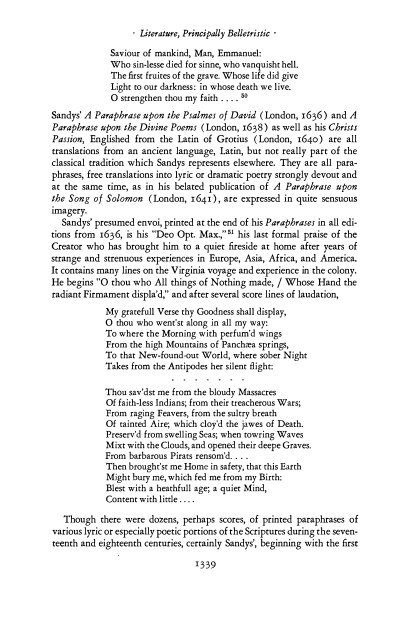Literature, Principally Belletristic - University of Tennessee, Knoxville
Literature, Principally Belletristic - University of Tennessee, Knoxville
Literature, Principally Belletristic - University of Tennessee, Knoxville
You also want an ePaper? Increase the reach of your titles
YUMPU automatically turns print PDFs into web optimized ePapers that Google loves.
· <strong>Literature</strong>, <strong>Principally</strong> <strong>Belletristic</strong> .<br />
Saviour <strong>of</strong> mankind, Man, Emmanuel:<br />
Who sin-Iesse died for sinne, who vanquisht hell.<br />
The first fruites <strong>of</strong> the grave. Whose life did give<br />
Light to our darkness : in whose death we live.<br />
o strengthen thou my faith .... 50<br />
Sandys' A Paraphrase upon the Psalmes <strong>of</strong> David (London, 1636 ) and A<br />
Paraphrase upon the Divine Poems (London, 1638 ) as well as his Christs<br />
Passion, Englished from the Latin <strong>of</strong> Grotius (London, 1640 ) are all<br />
translations from an ancient language, Latin, but not really part <strong>of</strong> the<br />
classical tradition which Sandys represents elsewhere. They are all para·<br />
phrases, free translations into lyric or dramatic poetry strongly devout and<br />
at the same time, as in his belated publication <strong>of</strong> A Paraphrase upon<br />
the Song <strong>of</strong> Solomon (London, 164 1), are expressed in quite sensuous<br />
imagery.<br />
Sandys' presumed envoi, printed at the end <strong>of</strong> his Paraphrases in all editions<br />
from 1636, is his "Deo Opt. Max.," 51 his last formal praise <strong>of</strong> the<br />
Creator who has brought him to a quiet fireside at home after years <strong>of</strong><br />
strange and strenuous experiences in Europe, Asia, Africa, and America.<br />
It contains many lines on the Virginia voyage and experience in the colony.<br />
He begins "0 thou who All things <strong>of</strong> Nothing made, / Whose Hand the<br />
radiant Firmament displa'd," and after several score lines <strong>of</strong> laudation,<br />
My gratefull Verse thy Goodness shall display,<br />
o thou who went'st along in all my way:<br />
To where the Morning with perfum'd wings<br />
From the high Mountains <strong>of</strong> Panch rea springs,<br />
To that New-found-out World, where sober Night<br />
Takes from the Antipodes her silent flight:<br />
Thou sav'dst me from the bloudy Massacres<br />
Of faith-less Indians; from their treacherous Wars;<br />
From raging Feavers, from the sultry breath<br />
Of tainted Aire; which cloy'd the jawes <strong>of</strong> Death.<br />
Preserv'd from swelling Seas; when towring Waves<br />
Mixt with the Clouds, and opened their deepe Graves.<br />
From barbarous Pirats rensom'd . ...<br />
Then brought'st me Home in safety, that this Earth<br />
Might bury me, which fed me from my Birth:<br />
Blest with a heath full age; a quiet Mind,<br />
Content with little . . ..<br />
Though there were dozens, perhaps scores, <strong>of</strong> printed paraphrases <strong>of</strong><br />
various lyric or especially poetic portions <strong>of</strong> the Scriptures during the seventeenth<br />
and eighteenth centuries, certainly Sandys', beginning with the first<br />
1339















